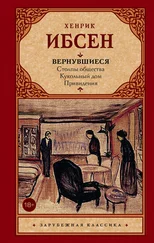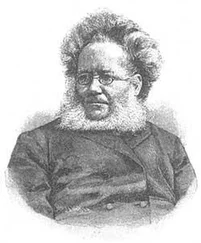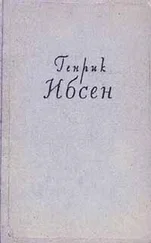MANDERS. I understand quite well. Go on.
ENGSTRAND. Well, that was how I raised her up and made an honest woman of her, so as folks shouldn't get to know how as she'd gone astray with foreigners.
MANDERS. In all that you acted very well. Only I cannot approve of your stooping to take money—
ENGSTRAND. Money? I? Not a farthing!
MANDERS. [Inquiringly to MRS. ALVING.] But—
ENGSTRAND. Oh, wait a minute!—now I recollect. Johanna did have a trifle of money. But I would have nothing to do with that. "No," says I, "that's mammon; that's the wages of sin. This dirty gold—or notes, or whatever it was—we'll just flint, that back in the American's face," says I. But he was off and away, over the stormy sea, your Reverence.
MANDERS. Was he really, my good fellow?
ENGSTRAND. He was indeed, sir. So Johanna and I, we agreed that the money should go to the child's education; and so it did, and I can account for every blessed farthing of it.
MANDERS. Why, this alters the case considerably.
ENGSTRAND. That's just how it stands, your Reverence. And I make so bold as to say as I've been an honest father to Regina, so far as my poor strength went; for I'm but a weak vessel, worse luck!
MANDERS. Well, well, my good fellow—
ENGSTRAND. All the same, I bear myself witness as I've brought up the child, and lived kindly with poor Johanna, and ruled over my own house, as the Scripture has it. But it couldn't never enter my head to go to your Reverence and puff myself up and boast because even the likes of me had done some good in the world. No, sir; when anything of that sort happens to Jacob Engstrand, he holds his tongue about it. It don't happen so terrible often, I daresay. And when I do come to see your Reverence, I find a mortal deal that's wicked and weak to talk about. For I said it before, and I says it again—a man's conscience isn't always as clean as it might be.
MANDERS. Give me your hand, Jacob Engstrand.
ENGSTRAND. Oh, Lord! your Reverence—
MANDERS. Come, no nonsense [wrings his hand]. There we are!
ENGSTRAND. And if I might humbly beg your Reverence's pardon—
MANDERS. You? On the contrary, it is I who ought to beg your pardon—
ENGSTRAND. Lord, no, Sir!
MANDERS. Yes, assuredly. And I do it with all my heart. Forgive me for misunderstanding you. I only wish I could give you some proof of my hearty regret, and of my good–will towards you—
ENGSTRAND. Would your Reverence do it?
MANDERS. With the greatest pleasure.
ENGSTRAND. Well then, here's the very chance. With the bit of money I've saved here, I was thinking I might set up a Sailors' Home down in the town.
MRS. ALVING. You?
ENGSTRAND. Yes; it might be a sort of Orphanage, too, in a manner of speaking. There's such a many temptations for seafaring folk ashore. But in this Home of mine, a man might feel like as he was under a father's eye, I was thinking.
MANDERS. What do you say to this, Mrs. Alving?
ENGSTRAND. It isn't much as I've got to start with, Lord help me! But if I could only find a helping hand, why—
MANDERS. Yes, yes; we will look into the matter more closely. I entirely approve of your plan. But now, go before me and make everything ready, and get the candles lighted, so as to give the place an air of festivity. And then we will pass an edifying hour together, my good fellow; for now I quite believe you are in the right frame of mind.
ENGSTRAND. Yes, I trust I am. And so I'll say good–bye, ma'am, and thank you kindly; and take good care of Regina for me—[Wipes a tear from his eye]—poor Johanna's child. Well, it's a queer thing, now; but it's just like as if she'd growd into the very apple of my eye. It is, indeed. [He bows and goes out through the hall.]
MANDERS. Well, what do you say of that man now, Mrs. Alving? That was a very different account of matters, was it not?
MRS. ALVING. Yes, it certainly was.
MANDERS. It only shows how excessively careful one ought to be in judging one's fellow creatures. But what a heartfelt joy it is to ascertain that one has been mistaken! Don't you think so?
MRS. ALVING. I think you are, and will always be, a great baby, Manders.
MANDERS. I?
MRS. ALVING. [Laying her two hands upon his shoulders.] And I say that I have half a mind to put my arms round your neck, and kiss you.
MANDERS. [Stepping hastily back.] No, no! God bless me! What an idea!
MRS. ALVING. [With a smile.] Oh, you needn't be afraid of me.
MANDERS. [By the table.] You have sometimes such an exaggerated way of expressing yourself. Now, let me just collect all the documents, and put them in my bag. [He does so.] There, that's all right. And now, good–bye for the present. Keep your eyes open when Oswald comes back. I shall look in again later. [He takes his hat and goes out through the hall door.]
MRS. ALVING. [Sighs, looks for a moment out of the window, sets the room in order a little, and is about to go into the dining–room, but stops at the door with a half–suppressed cry.] Oswald, are you still at table?
OSWALD. [In the dining room.] I'm only finishing my cigar.
MRS. ALVING. I thought you had gone for a little walk.
OSWALD. In such weather as this?
[A glass clinks. MRS. ALVING leaves the door open, and sits down with her knitting on the sofa by the window.]
OSWALD. Wasn't that Pastor Manders that went out just now?
MRS. ALVING. Yes; he went down to the Orphanage.
OSWALD. H'm. [The glass and decanter clink again.]
MRS. ALVING. [With a troubled glance.] Dear Oswald, you should take care of that liqueur. It is strong.
OSWALD. It keeps out the damp.
MRS. ALVING. Wouldn't you rather come in here, to me?
OSWALD. I mayn't smoke in there.
MRS. ALVING. You know quite well you may smoke cigars.
OSWALD. Oh, all right then; I'll come in. Just a tiny drop more first. There! [He comes into the room with his cigar, and shuts the door after him. A short silence.] Where has the pastor gone to?
MRS. ALVING. I have just told you; he went down to the Orphanage.
OSWALD. Oh, yes; so you did.
MRS. ALVING. You shouldn't sit so long at table, Oswald.
OSWALD. [Holding his cigar behind him.] But I find it so pleasant, mother. [Strokes and caresses her.] Just think what it is for me to come home and sit at mother's own table, in mother's room, and eat mother's delicious dishes.
MRS. ALVING. My dear, dear boy!
OSWALD. [Somewhat impatiently, walks about and smokes.] And what else can I do with myself here? I can't set to work at anything.
MRS. ALVING. Why can't you?
OSWALD. In such weather as this? Without a single ray of sunshine the whole day? [Walks up the room.] Oh, not to be able to work—!
MRS. ALVING. Perhaps it was not quite wise of you to come home?
OSWALD. Oh, yes, mother; I had to.
MRS. ALVING. You know I would ten times rather forgo the joy of having you here, than let you—
OSWALD. [Stops beside the table.] Now just tell me, mother: does it really make you so very happy to have me home again?
MRS. ALVING. Does it make me happy!
OSWALD. [Crumpling up a newspaper.] I should have thought it must be pretty much the same to you whether I was in existence or not.
MRS. ALVING. Have you the heart to say that to your mother, Oswald?
OSWALD. But you've got on very well without me all this time.
MRS. ALVING. Yes; I have got on without you. That is true.
[A silence. Twilight slowly begins to fall. OSWALD paces to and fro across the room. He has laid his cigar down.]
OSWALD. [Stops beside MRS. ALVING.] Mother, may I sit on the sofa beside you?
MRS. ALVING. [Makes room for him.] Yes, do, my dear boy.
OSWALD. [Sits down.] There is something I must tell you, mother.
MRS. ALVING. [Anxiously.] Well?
Читать дальше








